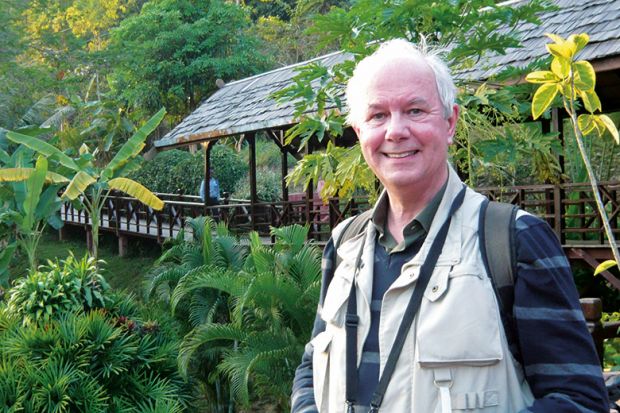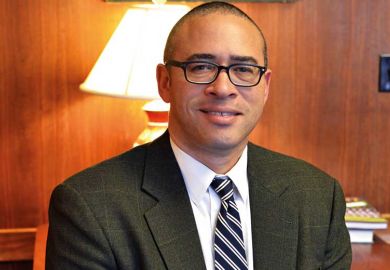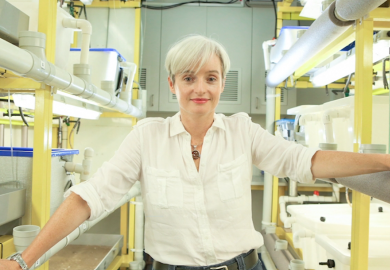Ian Stewart is emeritus professor of mathematics at the University of Warwick and a prolific popular science writer. From 1991 to 2001, he penned a mathematics column in Scientific American, and he was recently awarded the Euler Book Prize by the Mathematical Association of America for In Pursuit of the Unknown: 17 Equations That Changed the World. He was declared an “Honorary Wizard of the Unseen University” by Discworld author Sir Terry Pratchett in 1999.
Where and when were you born?
Folkestone, on the coast in Kent, on 24 September 1945.
How has this shaped you?
My parents used to take me for walks in “The Warren”, a rather wild area where the hills meet the sea. It was wooded, with narrow paths among the trees. On the beach you could find fossils. It was a great place for a scientifically inclined kid.
What sort of an undergraduate were you?
I was fairly quiet and introverted. But for two years I was also lead guitar in a rock band (the awfully named Shades of Night). The high points were being support band for Screaming Lord Sutch and Long John Baldry. So maybe I wasn’t that quiet…
What are the biggest misconceptions about the field of mathematics?
It’s easy to get the impression that the maths you’re taught at school is basically all there is; that nothing new ever gets done because everything was solved long ago; and that no one ever uses it anyway so it’s pointless. I think these ideas arise because few of us ever see mathematics in action – or rather, we see it in action all the time but don’t realise that there’s any maths going on. Mobile phones, GPS, medical scanners…our technology relies heavily on maths, but it’s all hidden behind the scenes. Maths gets you a greater range of jobs with better pay than almost any other subject. All this seems to be some kind of secret.
If you were the higher education minister for a day, what policy would you immediately introduce to the sector?
I would scrap all forms of bureaucratic assessment, of teaching and research both. Let the professionals do their job. Stop looking over their shoulders asking stupid questions, whose answers you won’t understand anyway because you’re not trained in that line of work. I appreciate that some sort of accountability is necessary, but you don’t need to fix it if it ain’t broke.
In 1997 you delivered one of the Royal Institution Christmas Lectures alongside a live tiger. Why, and how?
The lecture was about symmetry and patterns, and there are some fascinating applications to animal markings – spots on leopards and stripes on tigers. My friend Jack Cohen, a biologist who actually knows what an animal is, spent six months looking for a media-savvy tiger, and found one two weeks before the lecture. Nikka was a six-month-old tigress and gave a wonderful performance. I’ve always felt that my lecturing career peaked at that precise moment. How do you follow a tiger?
What is the worst thing anyone has ever said about your work?
“You’re writing too many books.” It was my publisher, and it was good advice in a way. But then, a few weeks later came an email: “I’ve just had a great idea for a new book…can you slot in an extra one?” That was good advice, too. The problem is, I’m prolific, I can’t help it. Isaac Asimov wrote more than 300 books, and advised everyone not to do the same unless they couldn’t avoid it. [So] 180 to go [for me]. As my wife says, it stops me hanging around in bus shelters.
Which forgotten figure in mathematics should everybody know about?
Emmy Noether [1882-1935] was the greatest female mathematician of her era. She started a revolution in mathematics by focusing on abstract structure rather than computational details. This led to greater generality, and greater power. Today’s mathematics – pure and applied – couldn’t exist without it.
What is the strangest gift you have ever received?
A possum skin. In 1976, my family and I spent six months in New Zealand. At one point I went to Christchurch for a week to give some talks, and some of the younger staff put me up in a tiny run-down cottage they were sharing. My hosts had caught a possum, and they decided to present me with its tanned skin as a memento.
What advice do you give to mathematicians trying to engage the public with their research?
Do it! Let me expand. A few colleagues ask that sort of thing from time to time, and tell me about some idea they have for presenting maths in a new, attractive, exciting way. Or, at least, a new way. Projects range from maths busking on street corners (“OK, lady, there’s a brand-new fiver for you if you can cut round this Möbius band and split it in half...”) to making an IMAX movie of the Mandelbrot set. “Do you think that’s worth a try?” they ask. To which I almost invariably reply “yes”. The more diversity the better.
If you were an academic living on the Disc [of Terry Pratchett’s fictional Discworld universe], what would you like to study?
The Laws of Magic. There should be some, but right now there aren’t.
Appointments
Catherine Exley, a professor of medical sociology at Newcastle University, has become associate pro vice-chancellor for research and innovation in health and life sciences at Northumbria University. Previously acting director of Newcastle’s Institute of Health and Society, her research focused on patients’ experiences of chronic disease and ageing and how technology could support them. “[Northumbria] has a reputation for academic excellence, pioneering teaching and international research,” Professor Exley said. “Throughout my career I have placed a strong emphasis on both teaching and research, and I believe strongly that research enhances teaching as well as having a significant impact on society.”
Francis Dodoo, a sociologist at Pennsylvania State University and former Olympian, has taken up the role of pro vice-chancellor for research, innovation and development at the University of Ghana. Professor Dodoo competed in the long jump and the triple jump for Ghana and is president of the Ghana Athletic Association. In his position as liberal arts research professor of sociology and demography in Penn State’s department of sociology and criminology, his research has covered issues including research development in sub-Saharan Africa, the impact of urban poverty and black immigrants in the US.
Harry Elam, who has been vice-provost for undergraduates at Stanford University since 2010, will take on two more roles: senior vice-provost for education and the new role of vice-president for the arts.
Denise Stephens will take up the position of vice-provost and university librarian at Washington University in St Louis, moving on from her position as university librarian at the University of California, Santa Barbara.
Dominic Shellard, vice-chancellor of De Montfort University, has been appointed special representative to the United Nations for the Gandhi Global Family, a charity that raises international awareness of the work of Mahatma Gandhi.
POSTSCRIPT:
Print headline: HE & me
Register to continue
Why register?
- Registration is free and only takes a moment
- Once registered, you can read 3 articles a month
- Sign up for our newsletter
Subscribe
Or subscribe for unlimited access to:
- Unlimited access to news, views, insights & reviews
- Digital editions
- Digital access to THE’s university and college rankings analysis
Already registered or a current subscriber?








